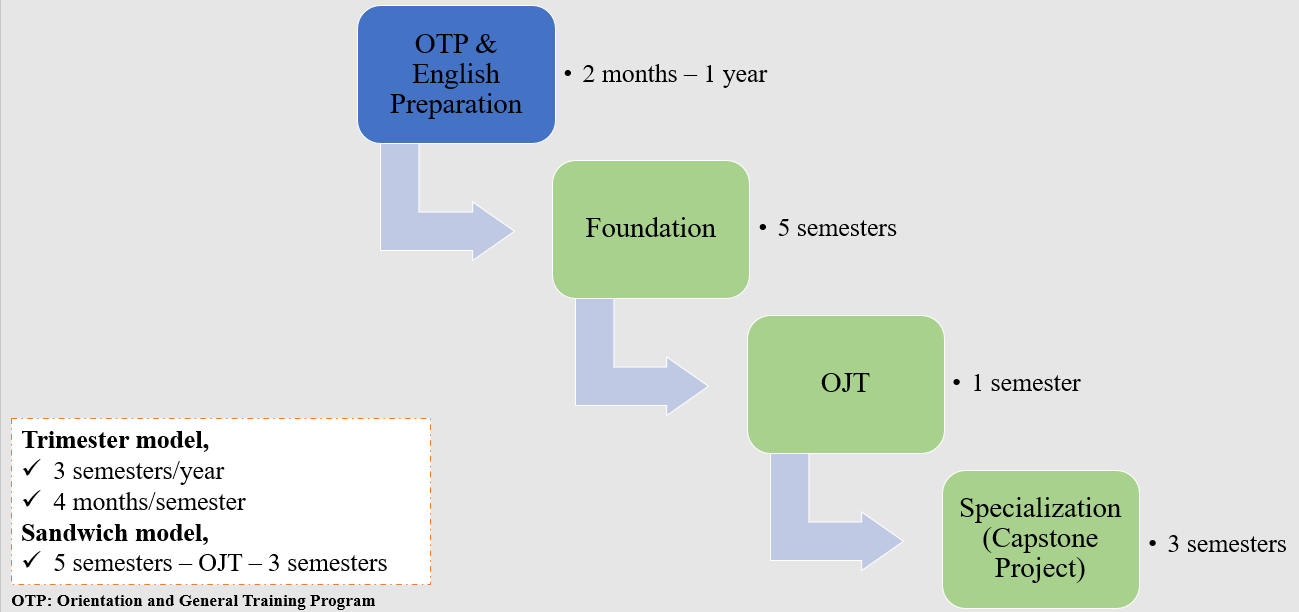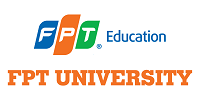General objective
The program of Bachelor of English Studies aims to train proficient bachelors with personality and capacity to meet the needs of society; be able to use English fluently at a minimum level equivalent to level 5 according to the 6-level Foreign Language Proficiency Framework for Vietnam or level C1 according to the Common European Framework of Reference for Languages (CEFR); have specialized knowledge about languages and cultures of English-speaking countries, have knowledge and skills needed to work in the fields related to the specialty. Students have a high spirit of self-study, are capable of self-training and gaining professional knowledge, qualities and skills to pursue further study and research or to become experts in their professional fields, and be able to work flexibly in the domestic and international environment.
Specific objectives
- PO1: Enable students to develop physically, mentally, intellectually, morally, and deepen national pride by equipping them with general knowledge of politics, law, economy, society, physical education, music, and national defense education.
- PO2: Provide students with foundational and in-depth knowledge of the English language and countries, cultures and people of English-speaking countries.
- PO3: Train students to have language skills together with communication, study and research skills, being proactive and flexible in studying and working in a multicultural environment.
- PO4: Orientate students towards the right attitudes and work ethics, abilities to think creatively, work well in groups and independently and abilities to solve problems related to jobs and industries using English and combining knowledge of International Business, Communication or Language Teaching effectively, and be capable of lifelong learning for personal and professional development.
- PO5: Help students use English fluently and use Chinese as the second language at a basic level.
Career prospects
- Graduates of the English Language major can work for domestic enterprises, foreign-invested enterprises, representative offices, international organizations, domestic, international and regional organizations on the economy, finance and technology related to some fields such as education, business, import and export, media, aviation, banking, audit, management, and research. Graduates can also do the following jobs:
– English lecturer, English teacher;
– Translator and interpreter;
– R&D specialist;
– Sales and business development staff;
– Assistant to (general) director, project director;
– Project specialist;
– Publishing and communication specialist;
– International news reporter;
– Jobs related to language and the use of the English language.
Program Learning Outcomes
| 1 | GENERAL KNOWLEDGE AND SKILLS |
| PLO1 | Demonstrate basic knowledge of social sciences, politics and law, national security and defense, contributing to the formation of worldview and scientific methodology. |
| PLO2 | Demonstrate an entrepreneurial, creative, critical, and problem-solving mindset. |
| PLO3 | Communicate and work in groups effectively in academic and practical environments. |
| PLO4 | Utilize English in communication and learning and be able to communicate simply in Chinese, equivalent to elementary level. |
| 2 | ETHICAL QUALITIES AND ATTITUDES |
| PLO5 | Demonstrate professional behaviors, morality, social responsibilities and a sense of dedication to community. |
| PLO6 | Be mentally and physically strong, be capable of expressing national identity and integrating confidently into the world. |
| PLO7 | Develop self-study and lifelong learning spirit and capabilities to adapt to the constant change of technology and society. |
| 3 | MAJOR KNOWLEDGE AND SKILLS |
| PLO8 | Demonstrate language capacity in 4 skills: Listening, Speaking, Reading, Writing fluently and achieve language proficiency in level 5 according to the 6-level Foreign Language Proficiency Framework for Vietnam or equivalent to level C1 according to the Common European Framework of Reference for Languages (CEFR) to serve effectively for academic, social, and professional purposes. |
| PLO9 | Demonstrate abilities to apply basic and in-depth knowledge of levels and aspects of the English language (phonetics, grammar, semantics) to study and professional practice. |
| PLO10 | Recognize and understand basic knowledge and characteristics of countries, people, cultures and customs and general knowledge on literature of English-speaking countries, and multicultural environments. |
| PLO11 | Apply language competence, together with research, synthesis, analysis and evaluation of data and information skills in learning and professional work, solving problems in a range of written/spoken forms. |
| PLO12 | Demonstrate understanding the professional characteristics and the required knowledge, capacity, attitudes and qualities for professions in various fields and career orientations related to the use of English such as interpreting and translation, teaching, communication, international business, etc. |
| PLO13 | Apply language and professional knowledge and skills, and interdisciplinary knowledge of culture, economy, politics, society and science to study and work with professional attitude and manners. |
Volume of knowledge in the program
145 credits, excluding the Orientation and General Training Program, Preparation English.
| No. | Module | Duration/ Number of courses | Credits | Notes |
| 1 | Orientation and General Training Program | 5 weeks | 0 | certificate |
| 2 | Preparation English | 0-1 year | 0 | certificate |
| 3 | Physical Education | Interleaved | 6 | certificate |
| 4 | Professional program, including On-the-Job-Training (OJT) | 9 semester | 139 | accumulate grades |
| 4.1 | General knowledge and skills | 12 courses | 32 | |
| 4.2 | Major knowledge and skills, including OJT | 16 courses | 55 | |
| 4.3 | Specialized knowledge and skills | 11 courses | 37 | |
| 4.4
|
Elective knowledge and skills | 5 courses | 15 |
Admission eligibility
– In accordance with regulations on formal university enrollment; college enrollment of the Ministry of Education and Training.
– In accordance with regulations on enrollment of FPT University.
Training process, graduating conditions
– In accordance with regulations on formal university and college training of the Ministry of Education and Training.
– In accordance with “Regulation on formal undergraduate education using academic credit system” in force by FPT University.
Evaluation method
– In accordance with “Regulation on formal undergraduate education using academic credit system” in force by FPT University.
A guide to implementation
-
- Training methods:
- Most of the courses of major and specialized knowledge and skills will use materials and exams in English.
- Forms of teaching and learning: Courses can be deployed in the form of on-campus teaching (offline) or online learning (on FPT-Coursera platform, EduNext, etc.) with assessment tests are performed at school.
- Sandwich model: The overall training program is implemented in 4 phases; students must complete the previous period before moving to the following one:
-
-
- Phase 1: Preparation (from 1 to 3 semesters), students are required to get a general English level equivalent to IELTS 6.0 before moving to learn professional programs;
- Phase 2: General knowledge and foundation courses (the first 5 semesters);
- Phase 3: On-the-Job-Training (semester 6);
-

-
- Teaching and Learning methods:
- Choose teaching and learning methods that help promote students’ experiences in university such as group work experiences, internship experiences and academic experiences in various forms within courses and learning periods.
- Exploit and apply a variety of teaching and learning methods such as social constructionism, experiencing, learning through projects, collaboration, etc. to enhance students’ active learning, facilitate and instruct learners to access and utilize knowledge from different learning materials and utilize the strengths of methods in the new technology era.


